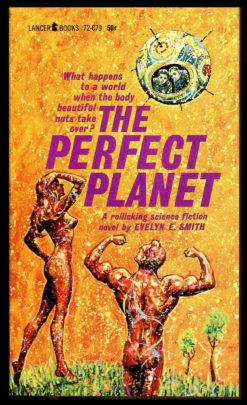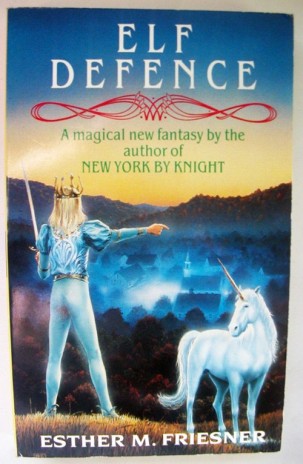
This post originally appeared at Spellbound Scribes.
Writing science fiction and fantasy is fun, and in my opinion, world-building is the bestest most funnest part. Whether you’re writing urban, historical, or alt-world fantasy, or a science fiction set in a galaxy far far away, world-building is a crucial part of the story-telling process. The world (or universe!) you create must be complex and multi-layered; it must be a place your characters operate in and interact with; and it must set the stage for your plot. It’s no easy task, and there are countless pitfalls at every stage of the process of creating a world.
Read to jump in? Here are my top cliches and tropes to avoid, listed in no particular order.
Basing your other world TOO much on Earth
This is one of the biggest and easiest traps to fall into. Earth’s history and many cultures are far-reaching and complex, and it can be tempting to borrow elements whole-sale without bothering to do much work creatively. Think of how many famous fantasy worlds resemble Medieval-era Earth completely, right on down to the rampant sexism and casual racism (*cough* Westeros *cough*). There’s nothing wrong with using our world’s history and cultures to inspire your made-up world, but make sure it doesn’t become a lazy short-cut. If there’s sexism or lack of diversity in your world, you need a better reason than “that’s how things were back then.” You’re writing fantasy, not historical fiction. Get creative!
Over-use of common nouns
You know what I’m talking about…
The Keeper of the Shadow Throne awaits the Birth of the Kindred.
A Rim-born Elder must name the Crystal Celebrant on the Day of Undoing.
Don’t get me wrong–naming things is half the fun of writing fantasy and science fiction. And capitalizing a regular old word or concept can definitely lend it a sort of otherworldly gravitas. Just be careful not to over-use this trope, or your world will quickly begin to feel lazy and unoriginal.
 Making your races/cultures/societies too homogenous
Making your races/cultures/societies too homogenous
So the indigo-skinned Topworlders enslaved the ruby-eyed Burrow Folk a hundred years ago, and now they hate each other with a vengeance. That’s fine, but does every Topworlder relish owning a Burrow slave? And do all Burrow Folk agree with the politics of the Burrow Queen who surrendered to the Topworlders’ superior technology instead of fighting for their land?
Here’s where taking cues from humanity is a good thing. I could strike up a conversation with the person sitting beside me on the bus and within ten minutes we’d be able to think of at least a few things we disagreed on–politics, religion, whether cilantro tastes like soap. Races, cultures, even sub-cultures don’t have monolithic beliefs that trump individuality. Make sure the individuals in your alien races or fantasy societies reflect this diversity.
Introducing a world-changing technology/magic without taking into account all its ramifications
“It’s like our world, but everyone can teleport!”
Yikes. The minute you start talking about wide-spread teleportation, it ceases to be anything like our world. How could it be? Something as potentially life-changing as that would have first-order, second-order, and third-order effects on the way a world was structured and the way its citizens operated within it. Do your world the service of thinking through massive changes in technology or magical power, and what kind of structural changes might arise from that.
Language that doesn’t reflect the world
Contextual short-hands and idioms are rife in the English language (or whatever language you’re writing in!) and they can really trip you up if you’re not careful. This is something I’m constantly correcting in my own worlds–if a concept or idea doesn’t exist in the world you’re creating, why would the character make any kind of reference to it? Good examples of this might be “inching along” if the unit of measurement isn’t inches, or “red as a rose” when there aren’t roses in space.
 Not thinking about minutiae
Not thinking about minutiae
Do you ever have that moment when you’re watching an intense adventure movie and you think to yourself “Good thing none of them have had to poop this whole time.”?
Worlds, at their core, are pretty boring. Your character may be battling the Dark Overlord of Doom, but the rest of the world isn’t. There’s waste removal and food service and communication infrastructure and architecture and the menial jobs that hold a society together. While your novel doesn’t have to focus inordinately on these things, it helps if you as an author have a basic understanding of how these processes work in your world, so there’s a seamless backdrop for the story to play out against.
Unless you’ve created a magical and majestic world were people literally just don’t poop.
Basing one-dimensional fictional ethnic groups on real-life ethnic groups
Okay, this is basically a continuation of the very first point, but it’s kind of a biggie. Rule of thumb, if you want to have Italians (or Native Americans, or the Irish, or Nigerians) in your fantasy or science fiction novel, you’re going to have to do your utmost to create an accurate and nuanced view of Italian culture. What you cannot do–please please don’t–is name them Etolians and have them running around shouting “Mamma Mia!” while they stuff their faces with spaghetti.
Any cultural or ethnic group within your novel should have multiple dimensions and a believable culture regardless of whether your main character comes from this culture or sees it as “other.” And this is where it gets tricky–the more your fictional group resembles the real-world group, the more you’re going to have to worry about being respectful and true to life. This becomes especially true when dealing with marginalized groups, but should really be implemented across the board. When in doubt, find a sensitivity reader, but that should be your back-up plan. Do your homework, and make sure you’re not basing a fictional ethnic group on a real-world ethnic group just because it’s easy.
Well, that’s world-building in a very large nutshell. Any questions? At the end of the day, creating a made-up world as complex, multi-faceted, and often nonsensical as our own world isn’t something that happens overnight. Take your time, be creative, and don’t rely on short-hand to make your point.
What are your favorite/least favorite SFF world-building tropes? Leave your thoughts in the comments below!
0 Comments